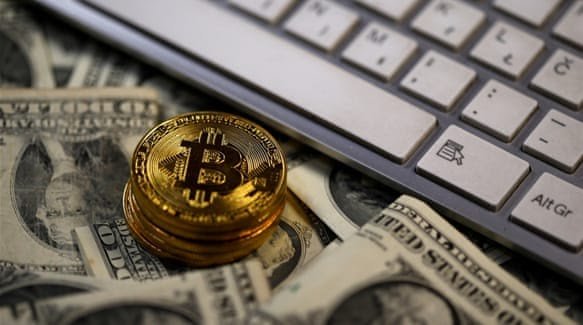
Major businesses and even governments are adopting alternative applications of the cryptocurrency technology.
The bitcoin cryptocurrency was created in 2009 [Reuters]
by
Tallha Abdulrazaq
Tallha Abdulrazaq is a researcher at the University of Exeter's Strategy and Security Institute.
Since the end of last year, people have been left dumbfounded by the meteoric rise in the value of bitcoin, the father of all cryptocurrencies. The digital currency started off in 2017 with a value of around $800, but, by the end of the year, was probably the highest-performing investment anyone could have ever made, as it reached dizzying heights of $19,783 in December. Such gains are enough to make the most well-heeled Wall Street sharks giddy with glee.
However, on the flipside, there has been a lot of concern recently that cryptocurrencies might be a bubble that could burst any day, crumbling the fortunes of many would-be investors and sending the markets reeling. On January 17, bitcoin's value suddenly halved as futures contracts on the cryptocurrency expired, sending shockwaves through the cryptocurrency market that buffeted even top performing "alt-coins" like ethereum and ripple.
While bitcoin's central role in the crypto market is undeniable, it is arguably in its own speculative bubble within the larger market, which contains more stable alt-coins. If bitcoin's bubble was to burst, it would inevitably stagger the $700bn market, as it occupies about a third of it. Also, many exchanges use bitcoin to buy and sell other cryptocurrencies or to convert them back into fiat. But investors are now diversifying their portfolios by buying other, arguably more stable cryptocurrencies that could absorb any blows that may shake the bitcoin pillar.
But what makes these other cryptocurrencies any different from bitcoin? Are they not just other bitcoins, only carrying different monikers? The answer to that lies in the technology used to validate bitcoin transactions, known as blockchain.
Blockchain as a service
Like peer-to-peer (P2P) networks where unidentified people upload and download music and films, the blockchain depends on a growing community of people and institutions online. Those peers run bitcoin software to verify bitcoin transactions, independent of any bank or treasury. Every time people exchange bitcoin online, the whole network gets updated with the new information, creating new "blocks", ie long chains of data for computers to solve.
In its simplest form, a blockchain is "a distributed open ledger that can record transactions between parties quickly in a verifiable and permanent way". As the data held on a blockchain is decentralised and immutable, it builds trust that "what you see, is what you get" as any retroactive changes to the chain will be immediately obvious.
Such technology lends itself to business transactions and the keeping of verifiable records. It may also be a vision of the future, as more and more major companies are adopting the technology, bringing it into the mainstream. While the current crypto craze is seen as a "nerds only" endeavour, businesses and even governments around the world are waking up to its possible applications, with major shipping firm Maersk and technology giant IBM announcing earlier this month that they will create their own blockchain.
Even Disney developed its own private blockchain in 2015, which has now evolved into dragonchain, a new competitor to number two cryptocurrency, ethereum.
Similarly, the Chinese government - which is notoriously strict on cryptocurrencies - has teamed up with a little-known but up and coming firm called VeChain. The company specialises in authentication and verification technologies, allowing sellers using its blockchain to provide assurance to their customers that they are buying what they are paying for. For instance, a car could be tracked from the production of its parts and where it was assembled, to the taxes, sales and any resales of the car. It also has implications for ethical standards, as the blockchain could verify the labour used to produce goods, and the payment for that labour.
Governments could also keep track of companies and how much tax they ought to be paying. As VeChain's CEO Sunny Lu told me at a recent blockchain event in London, governments have numerous departments and each interacts with numerous stakeholders, whether taxpayers or contractors. By using blockchain, governments can not only ensure that accurate records are kept, but that there will always be a clear audit trail that would make it harder for corruption to slip through the cracks.
Cryptocurrencies and blockchain are here to stay
While this may just sound like dull news one might find in a financial newspaper, its implications for everyday people are major. With blockchains, things as mundane as medical records, identity documents and even qualifications and credentials could be stored and verified easily, scrapping a lot of the day-to-day grind of dealing with the bureaucratic systems of modern life, and allowing employers to make sure that a person's CV, for instance, is not merely a fanciful story tailored to get a job.
Due to cryptocurrencies being used as decentralised tokens to execute transactions on blockchains, and considering governments and corporations are partnering with these blockchain developers who actually provide a service, investors see value in buying up other cryptocurrencies.
Unlike bitcoin, blockchain as a service that is directly applicable to our everyday lives is unlikely to simply collapse, especially considering its adoption by big players who clearly see a future for the technology.
Investing in cryptocurrencies that form part of a service ecosystem, rather than solely offering ethereal tokens that have no real, fundamental value, could prove to be the new stocks and shares, as blockchains move from being perceived as "just a fad" to a mainstream technology we all rely on in our day-to-day lives.
Hi! I am a robot. I just upvoted you! I found similar content that readers might be interested in:
http://www.aljazeera.com/indepth/opinion/cryptocurrencies-stay-bitcoin-blckchain-180201085633760.html
OK listen, I'm not a robot and I appreciate the time you spent for this post. @shabbirawan :)